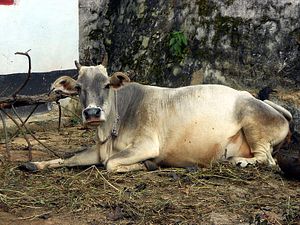Eleven months ago, the killing of Mohammad Akhlaq shook India. Akhlaq, a Muslim man living in Dadri, Uttar Pradesh, was killed by a Hindu mob that suspected him of storing and eating beef. The incident reinvigorated a nationwide debate on whether the victory of the right-wing Bharatiya Janata Party (BJP) in 2014 had empowered Hindu extremists around the country.
At the time, the perceived reluctance of the Indian prime minister, Narendra Modi, to immediately and unequivocally condemn the attackers was seen as opportunistic politicking. The Dadri lynching came just before a critical electoral test in Bihar, which the BJP went on to lose spectacularly. Modi, without directly addressing the issue of so-called “cow vigilantism,” called on Hindu-Muslim unity after the attack.
On Sunday, Modi finally came out with an unambiguous condemnation of the extremists around the country going to great lengths to protect cows. Modi took to Twitter, responding to a recent string of violent vigilante attacks on Dalits (low caste Hindus) and Muslims: “The sacred practice of cow worship & the compassion of Gau Seva (cow servants) can’t be misused by some miscreants posing as Gau Rakshaks (cow defenders),” he noted.
“There is absolutely no need for anyone to take the law in his or her hands and disturb the spirit of harmony and togetherness,” he added. Modi made no reference to any specific incident of cow vigilantism, but the impetus for his remarks was almost certainly the late-July brutal attack by vigilantes on four Dalits in Gujarat. The attacks went viral on social media and led to widespread protests by Dalit groups in Gujarat and elsewhere in the country.
The Una incident offers important political context for why the Indian prime minister decided to speak out now with unequivocal condemnation for the practice of cow vigilantism. Dalits, historically downtrodden both economically and socially, are an important and coveted political constituency for Indian political parties. Modi’s BJP is notably seeking Dalit votes ahead of upcoming state elections.
Outside Twitter, in public remarks, Modi offered more detail on how he would proceed on the issue of these attacks and lynchings across the country. “I urge the state governments to prepare a dossier of such self-proclaimed volunteers and big cow protectors. It will be found that 70 to 80 per cent are such people who commit such bad deeds which society does not accept. To hide their bad activities, they don the mantle of cow protectors,” he said.
The proposed response of preparing “dossiers” suggests a carefully calibrated response on Modi’s part. Had he outright called for the perpetrators of these attacks to be held criminally liable, Modi could have angered many within his own party’s extreme right flank.
In 2014, during his campaign for the prime ministership, Modi stoked fears of a “pink revolution,” referring to the previous Indian government’s perceived promotion of beef exports. “There is no subsidy for farmers or for rearing cattle, but the Congress gives subsidy to those who slaughter cows,” he had said at the time.

































